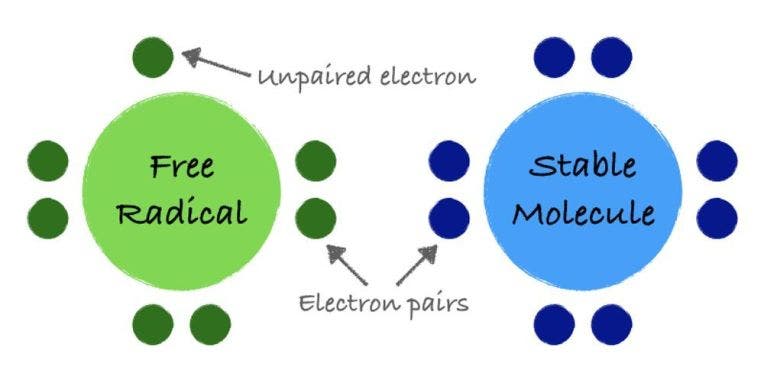Demystifying Free Radicals | Myths vs. Facts
In the world of cells, atoms, and molecules, dynamic entities are known as free radicals. A free radical is a highly reactive particle due to an unpaired electron. These molecules play a double-edged role in our health and the environment. From contributing to aging and various diseases to participating in essential biochemical reactions, free radicals are undoubtedly more than meets the eye.
In this blog, we’ll explore free radicals, understand their origin, and debunk the myths associated with them.
What are Free Radicals?
A free radical is a molecule with one or more unpaired electrons. This makes them highly reactive with other molecules in the body. Free radicals can be produced naturally in our bodies or introduced from external sources like pollution, radiation, and tobacco smoke.
Free radicals meaning, highly reactive, unstable molecules missing an electron in their outer shell. Due to this lack, they scramble to steal an electron from neighboring molecules, causing potential cellular damage. This process of 'electron theft' can disrupt the normal functioning of our cells and even lead to DNA mutations.
How Are Free Radicals Formed?
A free radical emerges from natural metabolic processes within our bodies and external sources. For instance, our bodies naturally produce these molecules when breaking down nutrients.
On the other hand, exposure to harmful environmental factors like tobacco smoke, ultraviolet radiation, or certain pollutants can introduce external free radicals into our systems. Many chemistry education supplies can detect the presence of free radicals.
Why Are Free Radicals a Concern?
The primary concern surrounding free radicals revolves around oxidative stress. When the body experiences an overload of free radicals, oxidative stress kicks in, damaging cells and DNA. This damage paves the way for many health issues, from aging skin to severe conditions like cancer and neurodegenerative diseases.
How to Counteract Free Radicals?
We can counter free radicals by limiting exposure to known sources of free radicals. Avoiding smoking, reducing alcohol intake, and managing stress are proactive measures. Coupling this with a diet rich in antioxidants can help neutralize free radicals before they wreak havoc.
Antioxidants | The Free Radical Neutralizers
Antioxidants are molecules that can donate an electron to free radicals without becoming unstable. By doing so, they stabilize free radicals, preventing potential damage. These are found abundantly in many foods.
Demystifying Free Radicals Myths vs. Facts
Free radicals are a topic of great discussion in the scientific community and the public sphere, particularly concerning their role in health and aging. They have been blamed for various health problems, from premature aging to cancer. But what are free radicals? Let’s debunk the myths and set the record straight with the facts.
Myth:
Free radicals are always harmful.
Fact
While primarily known for their potential harm, free radicals also have beneficial roles. They are a natural part of cellular processes. For instance, our immune cells use free radicals to kill bacteria and neutralize viruses. The key is balance. Problems arise when free radicals are overloaded, leading to oxidative stress, which can damage cells.
Myth:
Only external factors produce free radicals.
Fact
While environmental toxins, radiation, and certain foods can introduce free radicals, our bodies also produce them during normal metabolic processes, like when we exercise or convert food into energy.
Myth:
Antioxidants from supplements are always beneficial and can counteract all free radical damage.
Fact
Antioxidants can neutralize free radicals, thus preventing potential damage. While certain antioxidants from foods have been associated with health benefits, the efficacy of antioxidant supplements is still debated. Some studies even suggest that excessive supplementation might have detrimental effects. It's best to consult with a healthcare professional before starting any supplementation regimen.
Myth:
Aging is solely the result of free radical damage.
Fact
Aging is a complex process with various contributing factors. While oxidative stress from free radicals can accelerate aging and age-related diseases, it's just one of the many aspects of aging. Genetics, lifestyle, and other environmental factors play significant roles.
Myth:
All free radicals are the same.
Fact:
Different free radicals, like superoxide, hydroxyl, and nitric oxide radicals, can have other effects on the body. Their origin, whether internal or external, can also influence their impact on health.
Free radicals are a natural part of our biology and play beneficial and harmful roles in our bodies. The key to health is not necessarily eradicating them but ensuring a balance between free radicals and antioxidants. One way to support this balance is to consume a balanced diet rich in fruits and vegetables, which are natural sources of antioxidants. So it's always essential to differentiate between myths and facts to make informed decisions about our health.
Ready to delve deeper into the world of free radicals and their interactions? West Lab Canada, a trusted name in lab equipment supplies, is here for you!
We offer specialized lab equipment that helps you to detect the presence of free radicals. Explore more ways to enhance your labs and push the boundaries of knowledge with Westlab!


